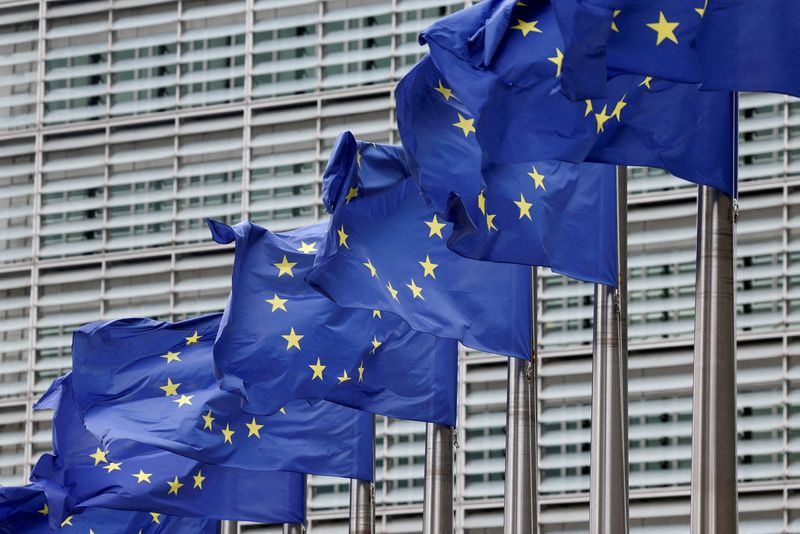By Andrew Gray and Jan Strupczewski
COPENHAGEN (Reuters) -European leaders expressed broad support on Wednesday for the idea of using Russian assets frozen in the West to provide a 140 billion euro loan to Ukraine but will discuss it further in three weeks to try and sort out legal aspects of the operation.
Since U.S. military financing for Kyiv is ending and many EU governments face fiscal struggles, the European Commission has proposed the EU should use the cash balances from frozen Russian central bank securities to support Kyiv in 2026 and 2027.
“We discussed the possibility of making better use of Russian immobilised assets. We will continue this discussion at our next European Council meeting in October,” the chairman of the meeting Antonio Costa said, referring to the next EU summit scheduled for Oct 23-24.
Ukraine would only repay the loan once Russia pays war reparations for the damage it has caused since its 2022 invasion of the country. This would allow Ukraine to use the money now, rather than wait until Moscow pays up.
“I strongly support the idea,” Danish Prime Minister Mette Frederiksen said after the leaders’ talks in Copenhagen.
INTERNATIONAL LAW COMPLICATES ISSUE
The main legal concern is that under international law, sovereign assets cannot be confiscated, so in organising the loan the EU will have to find a way to honour Moscow’s claim on its central bank assets.
Belgium, where most of the frozen assets are located, is adamant that before it agrees to the plan, it would need strong EU guarantees that it would not be left alone to deal with Moscow if the Russian assets had to be suddenly returned.
France and Luxembourg support that view. European Commission President Ursula von der Leyen said the EU executive would develop the plan further and make sure Belgium’s concerns are addressed.
“We have to flesh out the proposal much more and I was glad to see leaders’ interest in the concept,” von der Leyen said.
“It’s absolutely clear that Belgium cannot be the one who is the only member state that is carrying the risk, the risk has to be put on broader shoulders,” she said
The loan to Ukraine, which would be used to buy weapons and for the normal running of the country, will have to be guaranteed by EU governments. This raises two questions: how much each government would be liable for, and who benefits from Ukraine’s military purchases made with the loan.
The Kremlin condemned the proposal to use its frozen assets for a loan to Ukraine as “pure theft”.
G7 TO DISCUSS PARTICIPATION
A French government official said Paris was very much open to the loan idea, but that other G7 countries — the United States, Canada, Japan, and Britain — should also participate in guaranteeing the loan. France also wants Ukraine to buy weapons not only in the United States but in Europe as well.
Germany and Italy also have large defence industries keen for orders. G7 finance ministers were set to discuss their participation in a teleconference earlier on Wednesday.
CAUTIOUS BACKING FROM SOME LEADERS
In Copenhagen, Swedish Prime Minister Ulf Kristersson said he was “very much in favour” of the Commission’s loan idea. Dutch Prime Minister Dick Schoof said the proposal should seriously be considered as long as legal and financial risks were covered.
Others struck a more cautious note.
“I think that’s a difficult legal question,” Luxembourg Prime Minister Luc Frieden told reporters. “You can’t just take over assets that belong to another state so easily,” he said.
“There are now other proposals on the table, but these also raise a whole host of questions. I would like to have answers to these questions first. Among other things, how would such a loan be repaid? What would happen if Russia did not repay these reparations in a peace treaty?” he said.
Von der Leyen said she was confident the EU executive arm had found a legally sound way to make the loan happen.
German Chancellor Friedrich Merz said last week he expected leaders to give the Commission a mandate at the Oct 23-24 EU summit to prepare a concrete proposal that would be legally sound. The EU’s top diplomat Kaja Kallas said it was not yet possible to set a deadline for its completion.
“Not all member states are there, it’s not supported by everybody yet. We still have a lot of work to do, I can’t set a deadline, we are trying to do it as fast as possible,” she said.
(Additional reporting by Jacob Gronholt-Pedersen, Inti Landauro, Bart Meijer, Sudip Kar-Gupta, Teirney Kugal and Leigh Thomas; Writing by Jan Strupczewski; Editing by Hugh Lawson, Ingrid Melander)









